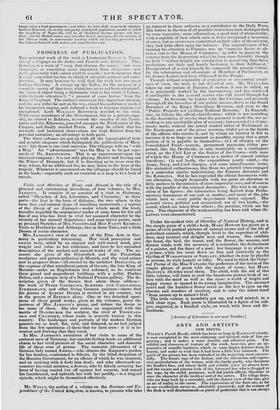Mr. WELLS, the author of a volume on the Revenue
and Ex- penditure of the United Kingdom, is known, to persons who take
an interest in these subjects, as a contributor to the Daily Press. His letters to the best of all possible instructors were distinguished by some ingenuity, some information, a good deal of whimsicality, with a rapidity of view which once or twice occasioned a largeness of error, but as errors were committed on both sides of the account, they' had little effect upon time balance. The original cause of his turning his attention to Finance, was an "anxious desire to ob- tain a seat in the House of Commons," in order to preserve the country from the. destruction which he long since foretold ; though he feels " neither delight nor satisfaction ia perceiving that these predictions are daily and hourly hastening to their fulfilment." Disappointed of a seat himself, he composed the present volume for the information and advantage of Members of Parliament, as his former Letters had been addressed to the People.
Though without originality of exposition or economical sound- ness of view, the work is not devoid of use. Mr. WeLes has taken up our system of Finance, if system it can be called, as it is practically worked by the bureaucracy, and has render( d it intelligible to the general reader who will travel through his volume. In Revenue, he begins with the Customs, and proceeds through all the branches of our public income, down to the Small Branches of the King's Hereditary Revenue, and even to the "Public Property not yielding National Revenue." In Expendi- ture, he follows the official classification ; which is not according to the description of service that the payment is made for, nor ac- cording to any intelligible plan of account ; but consists (1.) of pay- ments made, without the actual control either of Parliament or the Exchequer, out of the gross revenue, whilst yet in the hands of the officers who receive it, amid by whom an interest is felt to increase it to as large an amount as possible, seeing that a great portion of it is payable to themselves ; (2.) of charges on the Consolidated Fund—namely, permanent payments, either per- petual, like the Dividends, or only terminable on a contingent event, as the Civil List or the demise of the Crown—with none of which the House of Commons as a matter of annual routine interferes ; (3) and lastly, the expenditure yearly voted,— the Army, Navy, and Civil charges, and some miscellaneous items. His statistical authorites are, like those we selected when engaged in a somewhat similar undertaking, the Finance Accounts and the Estimates. But he has reprinted the official documents with- out alteration, though frequently with too great an attention to- little matters to the omission of more important ones, and of course with the jumble of the original documents. His 'text is an expo- sition of his figures; the information being derived from Parlia- mentary documents of one sort or another, and many of the jobs which lurk in every public department being exposed. His general views, political and economical, are of two kinds,—the sound, which are taken from others ; the peculiar, which are his own. The character of the workmanship has been told when the Letters were characterized.






















 Previous page
Previous page